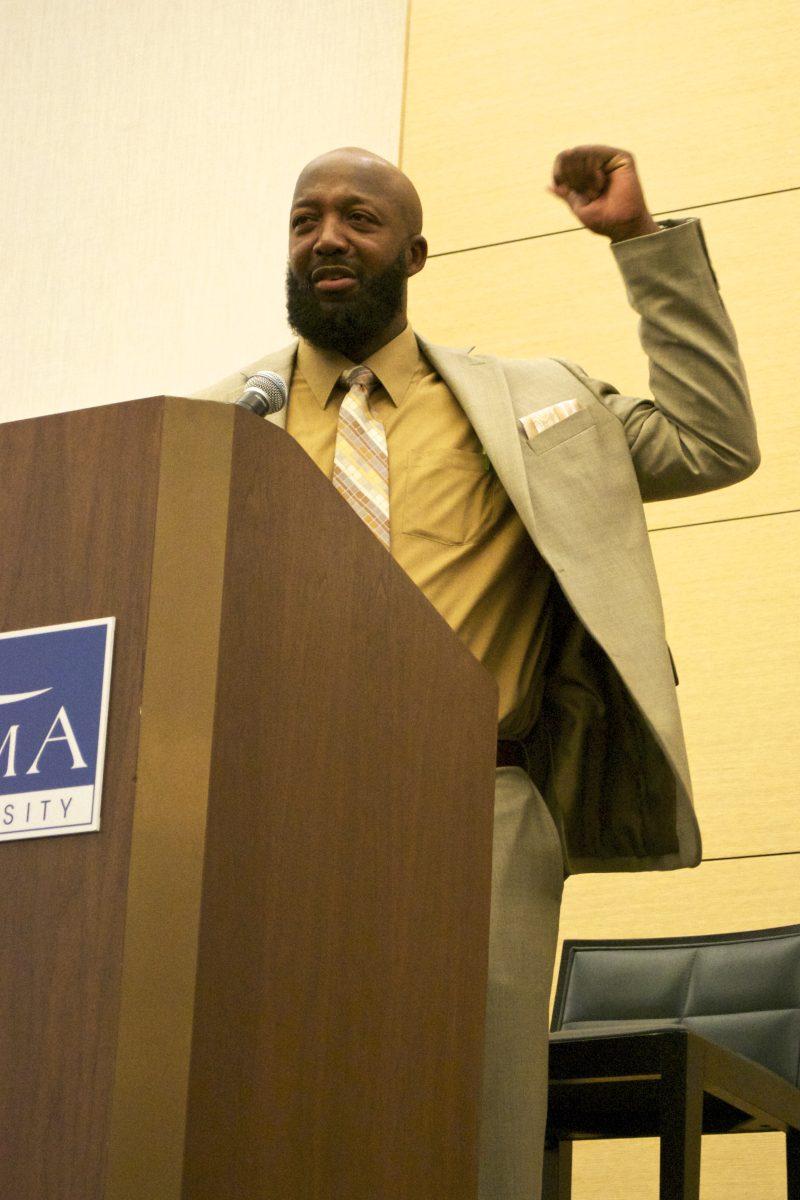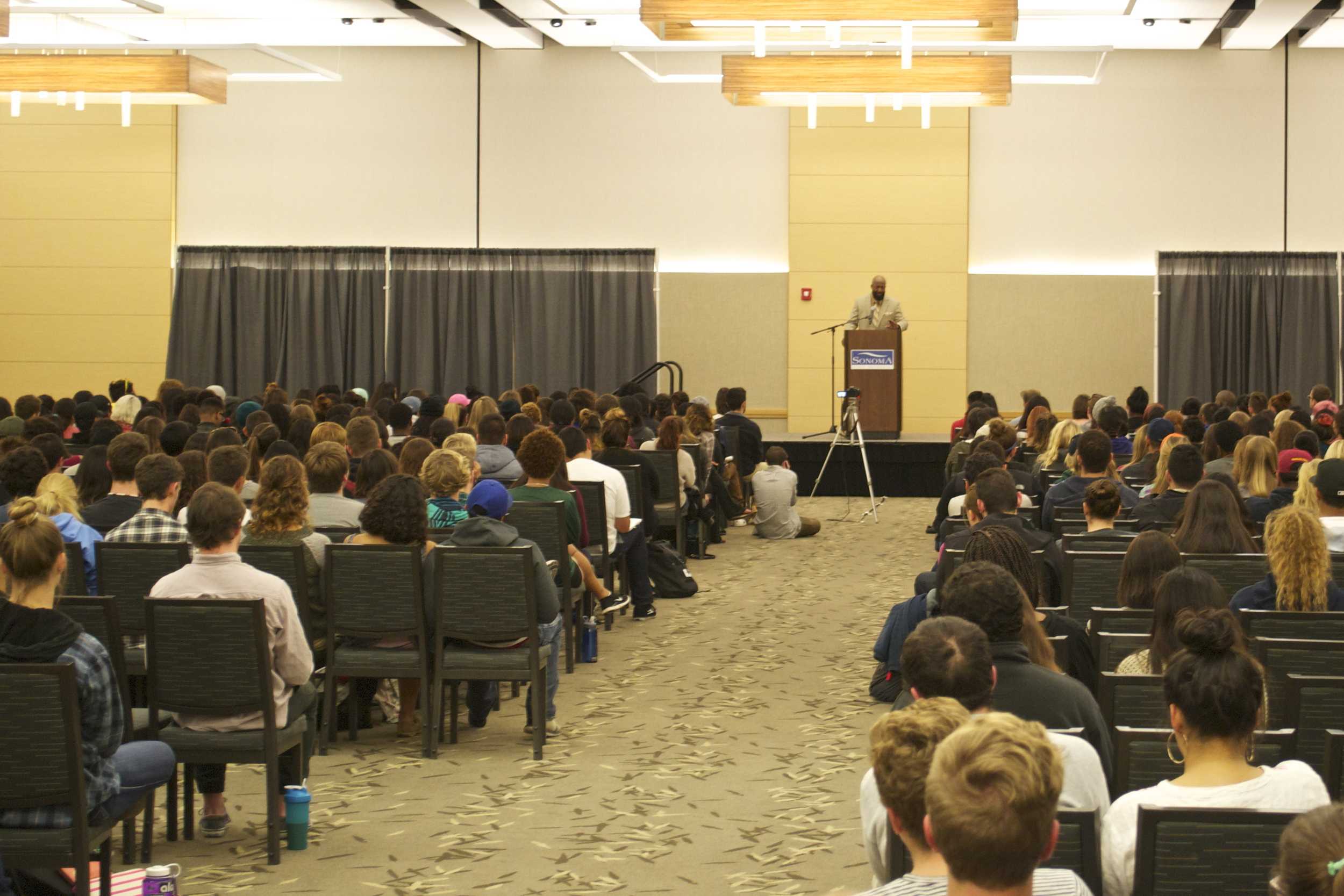Tracy Martin doesn’t have to be reminded how much time has passed. “Three years, seven months and four days ago Trayvon passed,” Martin told a Sonoma State University crowd on Wednesday. Martin said he has continuously counted the days, hours, minutes and even seconds since the day his son passed away.
Tracy Martin, who is the father of Trayvon Martin who was shot and killed in Sanford, Fla. Feb. 26, 2012 by a neighborhood watch volunteer, spoke at Sonoma State last week. His killing set off a national conversation about racial justice, gun violence and profiling that continues to this day.
Tracy Martin passionately spoke to students and guests about his son and family, along with race, education, laws and social change. He visited Sonoma State Wednesday evening and moved many listeners with his humbling voice and powerful words. Tracy Martin shared the struggles and heartache he and his family went through after losing Trayvon. The Martin’s experience with the justice system was an enormous let down, and the man who took his son’s life was cleared of all charges.
Tracy Martin and his family received letters, emails, calls and support from the community, he said. Some people were eager to take this tragedy to the streets in attempt to get Trayvon Martin justice. However, Tracy Martin and his family asked themselves what they can do to deescalate the situation. Rallies and riots have destroyed communities, referring to Ferguson rallies, and only further poverty in economically depressed areas.
“Two injustices do not make a right,” said Tracy Martin in attempt to channel negative energy into something positive has been difficult.
Nick Kilnger, a junior, thinks it’s great Tracy Martin took the time to come to Sonoma State and is reaching out to touch people’s lives.
“Tracy Martin has a wise perspective on many issues our country is dealing with today, and visiting colleges and sharing his message does have a heavy impact,” said Kilinger. “But reaching out to high schoolers and younger aged children would be very beneficial to communities as well.”
Tracy Martin also discussed his daughter and her homecoming dance and one of his son’s prom and graduation; a few major events a parent looks forward with their child, but something he will not get to experience with Trayvon Martin.
Values, morals and respect are things Trayvon Martin and his father would discuss frequently. Trayvon Martin’s parents were separated years ago but maintained a solid family foundation with both parents actively involved in their children’s lives as strong co-parents.
Broken homes have a heavy impact, especially on young men in society, Martin believes. Instilling respect in today’s youth is important. Sometimes police officers approach people in an intimidating manner, and don’t give each person an equal opportunity to explain themselves, Martin said.
Martin talked about the movement ‘Black Lives Matter’ and how the bible says god created man, not a black man, white man, a hispanic man, just man.
African Americans helped in wars and the building of this country’s foundation, but were excluded when it came to writing the laws and voting.
“The American system is not built for all mankind,” said Martin.
He emphasized the importance of diversity in helping people grow. Learning to understand each other and eliminating assumptions with skin color is the right direction for social change.
Junior Marissa Isaacs offered her own thoughts on racial profiling. “It’s unfortunate that today in this world stigmas and stereotypes exist that become hard to disregard and take day by day trying to disprove,” said Isaacs.
Martin grew up in east St. Louis, Illinois, a city that has struggled with poverty for decades. In his day, the city went on strike which affectedschools and families.
He stated that people are afraid to discuss racism still and ignore the fact that our country was built on diversity.
East St. Louis is 98 percent African American and the city is on strike again currently.
Martin believes that some do not want America to unite and succeed. He pointed out that our government doesn’t want to put a microsoft or starbucks in an impoverished areas, which would lead to economic change and potentially eliminate strikes that take children out of school, when they are the real ones suffering from the economic suppression.
Martin concluded his talk with questions from the audience. One guest asked what gives him hope after such a tragedy.
“Knowing you have a diversified group willing to fight for your cause,” said Martin. Their family received numerous letters and prayers from random supporters.
A question was asked about the Stand Your Ground Law in Florida and how he feels about it. “The Stand Your Ground law is a problem waiting to happen,” said Martin. It basically is saying that if you and another person get into an altercation and you get hurt, even though you started it, and if you shoot the other person, it can be considered self defense.
“How can you be defending yourself, when you are the one starting it,” said Martin.
Another question asked was concerning the fact many police are military veterans and are trained with violence and could potentially be trigger happy. Martin said, many police officers lack experience with diversity.
Any attitude or body language will set them off and they will gladly get out of the car with their finger on the trigger.
Earlier, Martin mentioned that many officers need to remain professional and not aggressively throw a person on the ground without any explanation.
The media and recordings should teach police a lesson but a big concern of Martin’s is how to prevent the violence before even needing video evidence. “America does not see the uproar,” said Martin.
Martin and his family shut down when they left the courtroom that day without justice for Trayvon. They learned to ignore the media and reporters.
He remains a strong parent to Trayvon’s siblings as well a coach for little league football. He invests himself in his family as well as programs for children and their communities as well as scholarships.




































